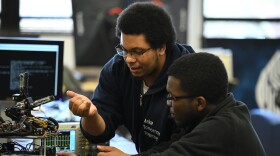A researcher at North Carolina Agriculture and Technical State University may have found a way to alter people’s peanut allergies with a reduced-allergen peanut.Since 2004, Dr. Jianmei Yu and her team have been working on a way to reduce the allergens in peanuts that make people have allergic reactions.
The idea came to her when working on veggie burger that used peanut flour.

“A lot of people in the United States are allergic to peanuts,” she said. “If this problem is not solved, the peanut veggie burger will not be consumed because of fear of accidental exposure.”
Since then, she’s experienced a lot of trial and error.
“The process had some disadvantages because it caused discoloration and a very unpleasant flavor and odor,” she said.
The process to reduce the allergens found in peanuts is pretty simple, if an edible enzyme is on hand. In this case, researchers use alcalase, an enzyme that breaks down proteins found in peanuts.
The peanuts are shelled, peeled and then soaked in alcalase, removing a majority of their allergenic compounds.
After they’re dried, they are ready to use in whatever manner someone wants to use them.
Though promising, Yu's research still needs years of clinical studies and FDA approval for broader use.
But not everyone is convinced about a possible reduced-allergen peanut hitting the market in the future.
Angela Fuller is the founder of the nonprofit association,. The group educates and supports families dealing with food allergies. Her son Holden, 8, is also allergic to peanuts.
Fuller said while she’s appreciative of the research, she thinks something like this will make things harder for parents and children with allergies, especially if companies do or don’t buy into the safer peanut.
“It’s going to be very difficult in settings to know 'Is this the safer peanut being eaten around my child or is this the unsafe peanut being eaten around my child?” she said.
Holden agreed.
“What if the new peanut was unsafe but they didn’t realize it and they’ve been eating it around me and then I got sick and died?” he asked.

Originally, Holden didn’t have a peanut allergy when he was born. Then at around 13 months, he was diagnosed with it after he had a small taste of peanut butter and his lips began to swell and he broke out in hives. 
However, he doesn’t mind the allergic reactions. His last severe reaction was last summer.
“It’s kind of fun going to the hospital because I get a lot of attention,” he said. “I also get to watch my awesome electronics, so I’m not really worried.”
He joins the three million other Americans who are allergic to peanuts according to the nonprofit organization .
Dr. Yu said mass food distributors have already shown interest and are performing their own tests on it. She is still waiting to hear back from them.
The next part of this process is animal testing. They’ve partnered with UNC Chapel Hill to test their experiment on mice and if everything works out, they’ll begin testing on humans.
There would be a cost to distribute a reduced-allergen peanut, but Dr. Yu said would be worth it.
“In the long run, I think people perhaps will be willing to pay for the cost to avoid any allergenic reaction and to have a peace of mind,” she said.
For Fuller, peace of mind may be harder to come by.
“I am skeptical that this is the way to do it,” she said. “I just don’t feel that at this point it’s realistic and I think that it creates a lot of grey area as far as if it truly does create a safe environment for our kids.”
Between 1997 and 2008, the number of children with peanut allergies tripled according to Food Allergy Research and Education.
Though this research could be life changing, Dr. Yu doesn’t see it that way.
“In the case of an accidental exposure, I think perhaps, the problem caused by this exposure will not be as serious as exposed to the regular peanuts,” she said.
Fuller certainly isn’t ready for a possible peanut-allergy free world either.
“It’s the only thing I know as a parent because he was my first child and so with the second one now, we suspect allergies now as well,” she said. “This is our life."








